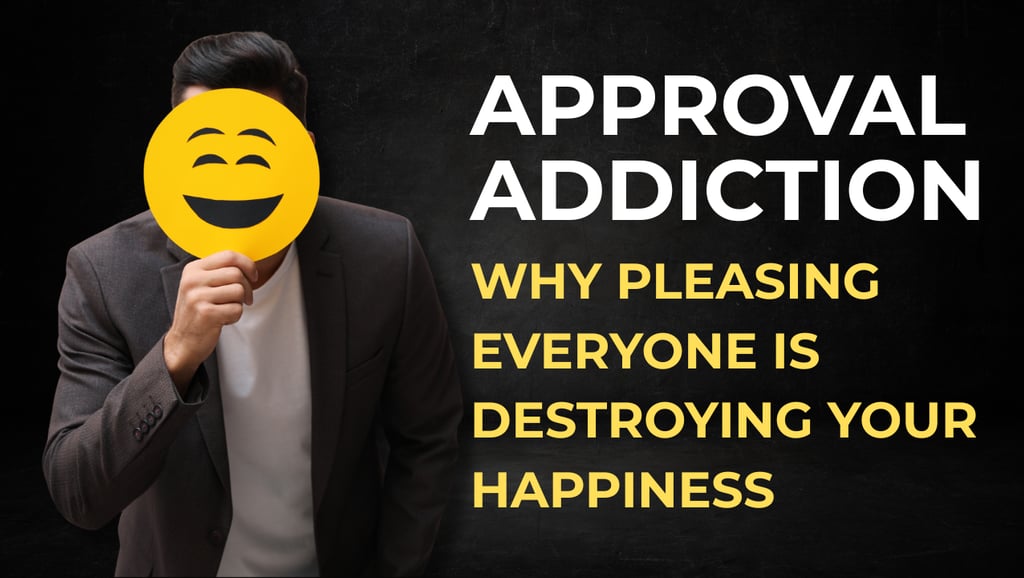Approval Addiction: How People-Pleasing Destroys Happiness
Are you constantly rewriting texts, saying yes when you want to say no, or chasing validation on social media? You may be caught in approval addiction—a hidden trap that destroys authentic relationships and drains your energy. In this post, I break down the three levels of approval addiction, the hidden costs of people-pleasing, and the daily rewiring practices that can help you stop living for others and start living for yourself. Discover how to: • Recognize the 3 levels of approval addiction. • Stop the cycle of people-pleasing without guilt. • Rebuild your confidence and reclaim your happiness. It’s time to stop performing for approval and start living authentically.
John Adams
8/30/20255 min read


Approval Addiction: Why Pleasing Everyone Is Destroying Your Happiness (And How to Finally Stop)
You edit the same text message three times before sending it.
You laugh at jokes you don’t find funny just to fit in.
You say yes when every fiber of your being wants to say no.
One negative comment on social media ruins your entire day.
If any of this sounds familiar, you might be caught in what I call the Approval Addiction trap. It’s one of five ego traps I break down in Episode 32 of my podcast, but this one deserves special attention because it’s the most common and the most destructive to authentic relationships.
The Hidden Cost of People-Pleasing
Here’s what most people don’t realize about approval addiction. It’s not really about being nice or caring about others. It’s your ego running a protection program that’s completely outdated.
Your brain learned early that acceptance equals safety. Get people to like you, and you won’t be rejected, abandoned, or hurt. Makes perfect sense for a five-year-old.
But you’re not five anymore.
The protection system that once kept you safe is now keeping you stuck in relationships where nobody knows the real you.
Think about it! If you’re always performing, always adjusting your personality to match what others want to hear, then the love and acceptance you get isn’t actually for you. It’s for the character you’re playing.
That’s why approval addiction feels so empty. You’re getting validation for someone who doesn’t actually exist.
The Three Levels of Approval Addiction
Most people think approval addiction is just about being a people-pleaser, but it runs much deeper. There are actually three levels, and most people don’t even recognize the deeper ones.
Level 1: The Obvious People-Pleaser
This is what everyone recognizes. You can’t say no. You over-apologize. You avoid conflict at all costs. You constantly ask “Is this okay?” or “Does this work for you?”
Level 2: The Strategic Charmer
This one’s sneakier. You’ve gotten good at reading rooms and becoming exactly what people want you to be. You’re funny with the funny people, serious with the serious people, spiritual with the spiritual people.
You pride yourself on being adaptable, but really you’re just a social chameleon with no core identity.
Level 3: The Invisible Controller
This is the deepest level. You’ve become so good at managing other people’s emotions and reactions that you think you’re being helpful. But really, you’re trying to control their opinion of you by controlling their emotional state.
You become the therapist, the fixer, the one who always has the right thing to say. It feels generous, but it’s actually the most manipulative form of approval addiction.
Which level sounds most like you?
The Approval Addiction Self-Assessment
Before you can rewire this pattern, you need to see how it shows up in your specific life. Answer these questions honestly:
Communication Patterns
• How many times do you rewrite texts or emails before sending?
• Do you rehearse conversations in your head before having them?
• How often do you agree with opinions you don’t actually share?
Emotional Reactions
• How long does criticism stay with you? Hours? Days? Weeks?
• Do you find yourself checking social media for validation?
• When someone seems upset, do you immediately assume it’s your fault?
Decision Making
• Do you ask for input on decisions you’ve already made?
• How often do you change plans to accommodate others?
• Do you find it hard to know what you actually want?
Energy Levels
• Do you feel drained after social interactions, even fun ones?
• Do you need time to “recover” your sense of self after being around others?
• Do you feel like you’re always “on” when people are around?
If you answered yes to most of these, you’re deeper in the approval trap than you might have realized.
The Daily Rewiring Practice
Here’s where most advice about people-pleasing goes wrong. People tell you to “just say no more” or “stop caring what others think.” That’s like telling someone with a broken leg to “just walk it off.”
You need to rewire the underlying pattern, and that takes practice.
The One-Percent No Practice
Start with the smallest possible no. Not the big dramatic boundary-setting moment. The tiny, insignificant no that barely registers to other people but feels huge to you.
“Do you want to sit here or there?”
“There’s fine.”
Instead of: “Oh, whatever works for you. I’m flexible. Where do you prefer?”
The Delayed Response Method
Every time someone asks you for something, practice this phrase: “Let me check my calendar and get back to you.”
Even if you know your answer. Even if it’s a simple request. Even if you feel weird saying it.
This creates space between the request and your automatic yes response. In that space, you can ask yourself what you actually want.
The Opinion Inventory
Once a day, notice a moment when you agreed with someone or went along with something. Ask yourself: “What do I actually think about this?”
Write it down. You’re rebuilding your relationship with your own opinions.
The Discomfort Tolerance Exercise
When you do say no or express a different opinion, pay attention to the physical sensations. The tight chest. The racing heart. The urge to immediately take it back or over-explain.
Just notice. Don’t try to fix or change the feeling. You’re teaching your nervous system that this discomfort isn’t dangerous.
What Nobody Tells You About Breaking Approval Addiction
The hardest part isn’t learning to say no. It’s dealing with how people react when you stop being who they expect you to be.
Some people won’t like the real you as much as they liked the people-pleasing version.
Here’s the painful truth: the moment you stop people-pleasing, some relationships will be tested.
I’ve experienced this firsthand. Just recently, I had to confront family members about choices and behaviors that were hurting the people I love. These weren’t easy conversations, they started with tension, defensiveness, and a lot of discomfort. For someone with approval addiction tendencies, that’s the exact kind of storm you want to avoid.
But instead of staying silent or sugarcoating, I chose honesty. And more importantly, I chose to deliver it with love.
What happened next surprised me. Once the gravity of the situation was clear, the walls started to come down. The conversations didn’t just end without conflict, they ended with real understanding.
That’s the piece nobody tells you: when you stop people-pleasing, yes, some people will pull away. But sometimes, “choosing authenticity, when paired with compassion”, doesn’t destroy relationships. It actually deepens them.
You’ll still feel lonely at times. You’ll still doubt yourself. But in those moments, remember this: the people who can handle the real you are the ones worth keeping close. And those relationships, built on truth instead of performance, are stronger than anything you’ll ever get through approval-seeking.
On the other side of approval addiction is something most people never experience: being loved for who you actually are instead of who you pretend to be.
Your Next Step
Pick one person in your life where you consistently people-please. Just one.
The next time they make a request or ask for your opinion, use the delayed response method. Create space between their ask and your automatic accommodation.
In that space, ask yourself: “What do I actually want here?”
Then honor that answer, even if it’s small, even if it feels uncomfortable.
Want the complete framework? In Episode 32 of the Health, Tech & Wellness Podcast, I break down all five ego traps that keep you stuck, including the approval addiction, perfectionist prison, happiness hoax, spiritual snob, and time traveler’s trick. Each one has a specific rewiring strategy that builds on this foundation.
I’d love to hear from you. Reply to this week’s Living95 Newsletter or send me a quick message on one of my socials:
Which level of approval addiction are you ready to break free from today?
Sometimes naming the pattern out loud is the first step to changing it.
| And as always, Stay healthy, stay balanced, and keep driving forward.
Inspiration
Empowering your journey to health and wellness.
Contact
johnadams@living95.com
© 2025 Living 95. All rights reserved.
